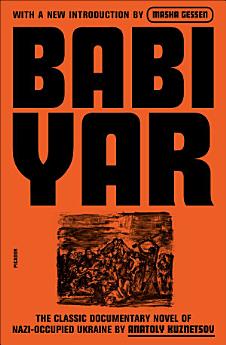Babi Yar
এপ্রি ২০২৩ · Macmillan + ORM
৫.০star
১টি রিভিউreport
ই-বুক
479
পৃষ্ঠা
family_home
উপযুক্ত
info
reportরেটিং ও রিভিউ যাচাই করা হয়নি আরও জানুন
এই ই-বুকের বিষয়ে
The acclaimed classic documentary novel depicting the Nazi occupation of Kyiv and one of the largest mass executions of the Holocaust.
“[A] masterpiece . . . every bit the peer of the canonical works of witness [such as] Anne Frank’s diary [and] Wiesel’s Night.” —George Packer, The Atlantic
At the age of fourteen, Anatoly Kuznetsov began keeping a diary of life in Ukraine under Nazi occupation. Years later, he combined those notebooks with other survivors’ memories to create classic work of documentary witness in the form of a novel. When a censored version of Babi Yar was first published in a Soviet magazine in 1966, it became a literary sensation, not least for its powerful and unprecedented narratives of the Nazi massacre of the city’s Jews, and later other victims, at Kiev’s Babi Yar ravine—one of the largest mass killings of the Holocaust.
Presented here in its full, uncensored form, Babi Yar is a classic of Holocaust and World War II testimony. With sustained immediacy, it relates a scrappy but principled boy’s day-to-day fight to survive and provide for his family. He dodges bullets and avoids transport to Germany, wonders at the pomp of the Nazis’ opera performances, overhears his mother and grandparents debate the merits of German versus Soviet rule, collects grenades and digs hiding places, and confronts the moral dilemmas of assisting neighbors or looting stores—all the while hearing the constant hum of bullets at the Babi Yar ravine nearby.
In a bravura feat of reporting, Kuzestov tells the story of what happened at Babi Yar—from the deceptive roundup of the city’s Jews and the execution of the national soccer team to the memories of the sites few survivors and the story of a daring escape. The book’s once-expurgated passages also expose the Soviet effort to hide the realities of wartime. Overall, here is a book that tells some of the past century’s most uncomfortable—and most essential—truths.
“[A] masterpiece . . . every bit the peer of the canonical works of witness [such as] Anne Frank’s diary [and] Wiesel’s Night.” —George Packer, The Atlantic
At the age of fourteen, Anatoly Kuznetsov began keeping a diary of life in Ukraine under Nazi occupation. Years later, he combined those notebooks with other survivors’ memories to create classic work of documentary witness in the form of a novel. When a censored version of Babi Yar was first published in a Soviet magazine in 1966, it became a literary sensation, not least for its powerful and unprecedented narratives of the Nazi massacre of the city’s Jews, and later other victims, at Kiev’s Babi Yar ravine—one of the largest mass killings of the Holocaust.
Presented here in its full, uncensored form, Babi Yar is a classic of Holocaust and World War II testimony. With sustained immediacy, it relates a scrappy but principled boy’s day-to-day fight to survive and provide for his family. He dodges bullets and avoids transport to Germany, wonders at the pomp of the Nazis’ opera performances, overhears his mother and grandparents debate the merits of German versus Soviet rule, collects grenades and digs hiding places, and confronts the moral dilemmas of assisting neighbors or looting stores—all the while hearing the constant hum of bullets at the Babi Yar ravine nearby.
In a bravura feat of reporting, Kuzestov tells the story of what happened at Babi Yar—from the deceptive roundup of the city’s Jews and the execution of the national soccer team to the memories of the sites few survivors and the story of a daring escape. The book’s once-expurgated passages also expose the Soviet effort to hide the realities of wartime. Overall, here is a book that tells some of the past century’s most uncomfortable—and most essential—truths.
রেটিং ও পর্যালোচনাগুলি
৫.০
১টি রিভিউ
লেখক সম্পর্কে
Anatoly Kuznetsov was born in Kiev in 1929. During World War II, he endured the Nazi occupation of the city, and later described his experiences in the documentary novel Babi Yar, which appeared in a Soviet magazine in 1966 and was later published abroad. He defected to Great Britain in 1969, and an uncensored version of Babi Yar was published in the United States in 1970 under the pseudonym A. Anatoli. He died in London in 1979.
ই-বুকে রেটিং দিন
আপনার মতামত জানান।
পঠন তথ্য
স্মার্টফোন এবং ট্যাবলেট
Android এবং iPad/iPhone এর জন্য Google Play বই অ্যাপ ইনস্টল করুন। এটি আপনার অ্যাকাউন্টের সাথে অটোমেটিক সিঙ্ক হয় ও আপনি অনলাইন বা অফলাইন যাই থাকুন না কেন আপনাকে পড়তে দেয়।
ল্যাপটপ ও কম্পিউটার
Google Play থেকে কেনা অডিওবুক আপনি কম্পিউটারের ওয়েব ব্রাউজারে শুনতে পারেন।
eReader এবং অন্যান্য ডিভাইস
Kobo eReaders-এর মতো e-ink ডিভাইসে পড়তে, আপনাকে একটি ফাইল ডাউনলোড ও আপনার ডিভাইসে ট্রান্সফার করতে হবে। ব্যবহারকারীর উদ্দেশ্যে তৈরি সহায়তা কেন্দ্রতে দেওয়া নির্দেশাবলী অনুসরণ করে যেসব eReader-এ ফাইল পড়া যাবে সেখানে ট্রান্সফার করুন।




